The idea that the Westminster parties should cooperate on Brexit negotiations is gaining support from the public, businesses and senior politicians from across the political spectrum.
With less than a week before formal negotiations with the EU are due to get under way, politicians including John Major, William Hague, Yvette Cooper, Harriet Harman and Nicola Sturgeon are openly calling for all parties to be involved in the talks.
They are hoping that a consensual approach will secure a softer version of Brexit than the one threatened by Theresa May in January, when she ruled out membership of the single market and the customs union.
A post-election poll by YouGov found that 51% would prefer Brexit to be negotiated by a cross-party team.
Majority of Brits want Brexit to be negotiated by a cross-party team - 30% want the Tories to negotiate them alone https://t.co/coswZ4rX3N pic.twitter.com/7w9uDc7Mc6
— YouGov (@YouGov) June 12, 2017
A petition calling on Brexit to be negotiated by a multi-party committee has more than 80,000 signatures.
Senior figures in the City, including the HSBC chairman, Douglas Flint, and Anne Richards, the head of asset managers M&G, have also called for an “all the talents” approach to Brexit, according to the FT.
The Conservative former prime minister Sir John Major has become the most senior figure to back opening up the Brexit negotiations. Speaking on BBC Radio 4’s World at One programme, he said: “The views of the 48% cannot be brushed aside as some of the more rigorous hardline Brexiteers wish … I don’t think we should rule out the concept of a really good deal on the single market.”
He added: “We need to get down to solid details in these negotiations. The referendum was an awful campaign on both sides. The public need facts and not idle hopes about our future negotiations with the European Union. It would be very wise indeed to bring in much wider parliamentary opinion so that when the prime minister has a deal she can be certain going to have parliamentary and public support for that deal.” Frontbench Labour figures have not publicly backed the idea. Since the election Jeremy Corbyn has spoken in vague terms about the need for a “jobs-first Brexit”. But the Telegraph claimed senior cabinet ministers were in talks with Labour MPs to secure cross-party backing for a soft Brexit.
Asked whether Corbyn should support and serve on any cross-party Brexit commission, Labour’s former deputy leader Harriet Harman told the BBC: “Well, I think that’s a matter for him to decide, but I think that it would be in the national interest for us to try and stop the pig’s ear of a job that the Tories have been doing.”
The prominent leave campaigner Michael Gove, who has returned to the cabinet in May’s minor reshuffle, said he wanted to achieve consensus on Brexit in the national interest.
He said he rejected the terms soft and hard Brexit. Speaking to BBC Breakfast, he said he had discussed Brexit with his opponents. “I talk to politicians from every party in order to make sure that we get the right approach. During the referendum campaign I worked with Labour politicians like Gisela Stuart and in this [last] parliament I’ve been on the Brexit select committee with Hilary Benn and a variety of others, so of course I talk to people from different parties, that’s what governing in the national interest is all about.”
On Monday the former shadow home secretary Yvette Cooper called for a cross-party commission on Brexit. Writing in the Guardian, she said:
After the referendum last year, I called for the government to approach this in a cross-party way to get the best deal. Now it is more important than ever. There is neither strength nor stability in a narrow, bunkered one-party approach; you need to include people with different ideas to get the best deal and widest support.
So we should set up a small cross-party commission to conduct the negotiations, and have a clear and transparent process to build consensus behind the final deal. It should be accountable to parliament but avoid getting caught up in the inevitable hung parliament political rows.
The Conservative former foreign secretary William Hague put forward a similar argument in an article for the Telegraph on Tuesday. He wrote:
Call in the CBI, the Institute of Directors, the British Chambers of Commerce, the Federation of Small Businesses, the TUC, the first ministers of the devolved governments, and the leaders of all the opposition parties – yes, even Corbyn – leading MPs of all parties, and say: ‘If you are willing to discuss how to make this work within these parameters, come in and we will be open to your views. There isn’t a perfect solution, but on how to conduct a transitional period and how to help the economy through Brexit as a priority we will work with you. Otherwise, we will just have to try to do this without you.’
Others pushing the idea include the Labour peer Andrew Adonis, the longstanding Labour MP Barry Sheerman, and Nicola Sturgeon, the SNP leader.
On Monday Sturgeon called on May to pause the Brexit negotiations. “It is imperative that we now build a cross-party, all-government approach to Brexit that will protect all of our interests at this highly uncertain time,” she said. “The strongest possible position in the Brexit negotiations will be one that is backed by all parties and all governments across the UK.”
Writing in the Standard, Lord Adonis said: “If the mainstream majority among Tory and Labour MPs assert themselves across the party divide, they can save us from the deep damage which a majority Theresa May government would have inflicted on the UK by forcing Britain out of the European single market and customs union.”
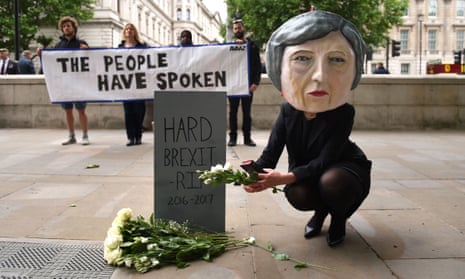
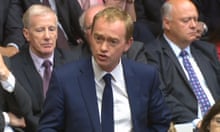


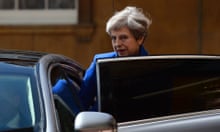
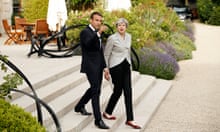

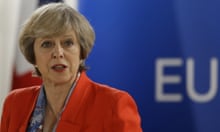

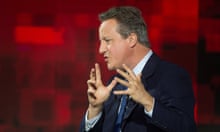
Comments (…)
Sign in or create your Guardian account to join the discussion